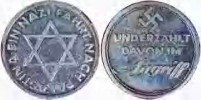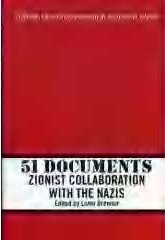Herzl and his successors were proven correct. It was an anti-Semite, Balfour, who enabled Zionism to entrench itself in Palestine. Although Israel was ultimately established through armed revolt against Britain, if it had not been for the presence of the British Army during the early years of the Mandate, the Palestinians would not have had the slightest problem pushing Zionism out.
But we are victims here of a sleight-of-hand trick. Balfour did give Zionism its toe-hold in Palestine, but did the British Mandate protect the Jews against their enemies in Europe?
Anti-Semitism could always be fought. It was not only fought, it was defeated in France, Russia and the Ukraine without any help from the World Zionist Organisation. Had the people of those countries followed the dictates of the Zionists, the anti-Semites would never have been defeated.
The policies of the early WZO were continued, in all essentials, by Chaim Weizmann, the main leader of the organisation during the Hitler epoch. Those elements in the WZO who wanted to make a stand against Nazism in the 1930s always found their main internal enemy in the President of their own movement. Nahum Goldmann, himself to become a post-Holocaust President of the WZO, later described in a speech the fierce arguments on the subject between Weizmann and rabbi Stephen Wise, a leading figure in American Zionism:
I remember very violent discussions between him and Weizmann, who was a very great leader in his own right, but who rejected every interest in other things. He did take an interest in saving German Jews in the period of the first years of Nazism but World Jewish Congress, fight for Jewish rights, not that he denied their need, but he could not spare the time from his Zionist work. Stephen Wise argued with him “but it is part and parcel of the same problem. If you lose the Jewish Diaspora you will not have a Palestine and you can only deal with the totality of Jewish life. [i]
Such was Zionism, and such its leading figure, when Adolf Hitler strode on to the stage of history.
----------
i. Nahum Goldmann, Dr Stephen S. Wise, A Galaxy of American Zionist Rishonim, pp.17-18.



No comments:
Post a Comment